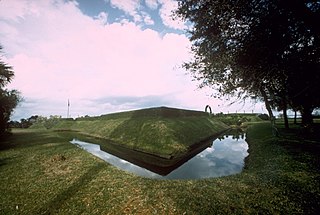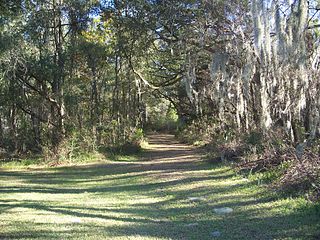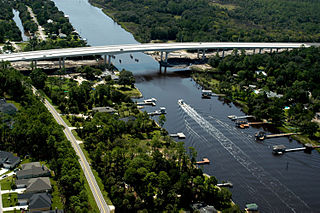St. Johns, Florida may refer to:
- St. Johns, Florida, an unincorporated community
- St. Johns County, Florida
- St. Johns River in Florida
- St. John's Cathedral, Jacksonville
St. Johns, Florida may refer to:

Putnam County is a county located in the northern part of the state of Florida. As of the 2020 census, the population was 73,321. Its county seat is Palatka.

Jacksonville is the most populous city proper in the U.S. state of Florida, located on the Atlantic coast of northeastern Florida. It is the seat of Duval County, with which the City of Jacksonville consolidated in 1968. It is the largest city by area in the contiguous United States as of 2020.

St. Johns County is a county in the northeastern part of the U.S. state of Florida. As of the 2020 United States census, its population was 273,425. The county seat and most populous incorporated city is St. Augustine, although the nearby community, St. Johns, has a higher population. St. Johns County is part of the Jacksonville metropolitan area.

St. Augustine is a city in and the county seat of St. Johns County located 40 miles south of downtown Jacksonville. The city is on the Atlantic coast of northeastern Florida. Founded in 1565 by Spanish explorers, it is the oldest continuously inhabited European-established settlement in what is now the contiguous United States.

John Ellis "Jeb" Bush is an American politician and businessman who served as the 43rd governor of Florida from 1999 to 2007. A member of the Bush political family, he was an unsuccessful candidate for president of the United States in the 2016 Republican primaries.

East Florida was a colony of Great Britain from 1763 to 1783 and a province of the Spanish Empire from 1783 to 1821. The British gained control over Spanish Florida in 1763 as part of the Treaty of Paris which ended the Seven Years' War. Deciding that the colony was too large to administer as a single unit, British officials divided Florida into two colonies separated by the Apalachicola River; the colony of East Florida, with its capital located in St. Augustine and West Florida with its capital located in Pensacola. East Florida was much larger and comprised the bulk of the former Spanish colony and most of the current state of Florida. It had also been the most populated region of Spanish Florida, but before control was transferred to Britain, most residents – including virtually everyone in St. Augustine – left the territory, with most migrating to Cuba.

The St. Johns River is the longest river in the U.S. state of Florida and it is the most significant one for commercial and recreational use. At 310 miles (500 km) long, it flows north and winds through or borders twelve counties. The drop in elevation from headwaters to mouth is less than 30 feet (9 m); like most Florida waterways, the St. Johns has a very slow flow speed of 0.3 mph (0.13 m/s), and is often described as "lazy".

Fort Caroline was an attempted French colonial settlement in Florida, located on the banks of the St. Johns River in present-day Duval County. It was established under the leadership of René Goulaine de Laudonnière on 22 June 1564, following King Charles IX's enlisting of Jean Ribault and his Huguenot settlers to stake a claim in French Florida ahead of Spain. The French colony came into conflict with the Spanish, who established St. Augustine in September 1565, and Fort Caroline was sacked by Spanish troops under Pedro Menéndez de Avilés on 20 September. The Spanish continued to occupy the site as San Mateo until 1569.

The Florida East Coast Railway is a Class II railroad operating in the U.S. state of Florida, currently owned by Grupo México.
Saint John's or St. John's may refer to:

The Marjorie Harris Carr Cross Florida Greenway is a protected green belt corridor, more than one and a half miles (1.6 km) wide in places, that was the former route of the proposed Cross Florida Barge Canal. It is named for the leader of opposition to the Cross Florida Barge Canal, Marjorie Harris Carr, and was originally a U.S. Army Corps of Engineers canal project to connect the Gulf of Mexico and the Atlantic Ocean across Florida for barge traffic. Two sections were built, but the project was ultimately cancelled because of local opposition related to environmental concerns, including protecting the state's water supply and conservation of the Ocklawaha River Valley ecosystem, as well as national opposition for the costs being perceived as "government waste" with "limited national value." The greenway is part of the system of Florida State Parks, including the Santos Trail System, and is managed by the Florida Department of Environmental Protection.
St. John's Cathedral, St. John Cathedral, or Cathedral of St. John, or other variations on the name, with or without the suffix 'the Evangelist', may refer to:

Ponte Vedra Beach is a wealthy unincorporated community and suburb of Jacksonville, Florida in St. Johns County, Florida, United States. Located 18 miles (29 km) southeast of downtown Jacksonville and 26 miles (42 km) north of St. Augustine, it is part of the Jacksonville Beaches area, and on the island nicknamed San Pablo Island.

The Indian River Lagoon is a grouping of three lagoons: the Mosquito Lagoon, the Banana River, and the Indian River, on the Atlantic Coast of Florida; one of the most biodiverse estuaries in the Northern Hemisphere and is home to more than 4,300 species of plants and animals.

The 2006 Florida gubernatorial election took place on November 7, 2006. Incumbent Republican Governor Jeb Bush was term-limited, and could not run for reelection to a third consecutive term. The election was won by then-Republican Charlie Crist, the state's Attorney General. The election was notable in that for the first time, the state elected a Republican governor in three consecutive elections.
Dead River may refer to:
Channel 63 refers to several television stations:
John Paul II High School, or any other combinations with or without the words Catholic, Pope, or Saint refers to several Catholic secondary schools named after John Paul II, Pope from 1978 to 2005, canonised as a saint in 2014. Some were renamed to include "Saint" or "the Great" rather than "Pope" after the canonisation.
Saint John River may refer to:

The 2018 Florida gubernatorial election was held on November 6, 2018, to elect the next governor of Florida, alongside an election to the United States Senate, elections to the United States House of Representatives and other state and local elections. Incumbent two-term Republican governor Rick Scott was term-limited and could not run for a third term, and he successfully ran for Florida's Class I Senate seat.